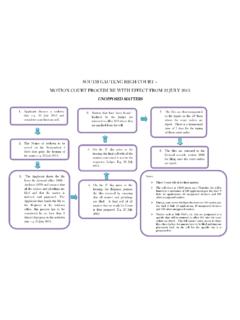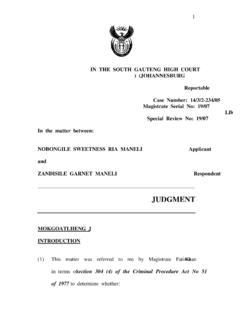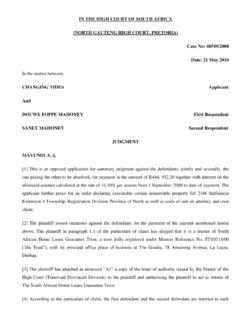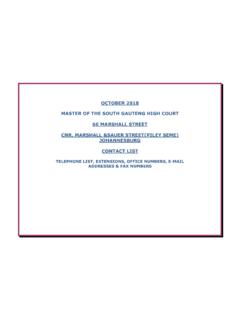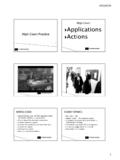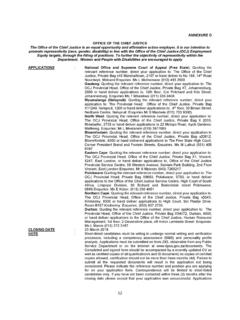Transcription of IN THE HIGH COURT OF SOUTH AFRICA (NORTH GAUTENG …
1 SAFLII Note: Certain personal/private details of parties or witnesses have been redacted from this document in compliance with the law and SAFLII PolicyIN THE high COURT OF SOUTH AFRICA ( north GAUTENG high COURT , PRETORIA)CASE NO: 5181/2010 DATE:11/02/2011In the matter between:Z A K U D G M E N TMNGQIBISA-THUSI J[1] The plaintiff issued summons in terms of which it is seeking rectification of clause 3 of a written agreement he alleges he concluded with the defendant on 25 March 2009.[2] In its particulars of claim the plaintiff alleges that clause 3 of the alleged agreement does not reflect the common intention of the parties at the time the agreement was concluded.[3] Clause 3 which the plaintiff seeks to be rectified reads as follows:".. D will have the rights to occupy this property or to operate the lodge on this property, subject to the following conditions. As D is desirous to revert to her maiden name, an attorney will be instructed to re-register the deed of ownership in the names of the two parties on conclusion of the divorce.
2 From the date of divorce, D:a Will be fully responsible for all expenses relating to the farm and the lodge such as electricity, rates and taxes, levies and the like; b Will be entitled to all profits and responsible for all losses stemming from operating a lodge on this property." [4] Attached to the plaintiff's particulars of claim is a copy of an agreement to which reference is made.[5] In his particulars of claim the plaintiff further alleges that at the time the agreement was reduced to writing, the plaintiff and the respondent's common intention was they would jointly own the immovable property, Portion 8 Balule Nature Reserve, Hoedspruit (the property); they would both be entitled to occupy the property and the defendant would be entitled to operate a lodge thereon; from the date of divorce all expenses relating to the property would be paid as the plaintiff would pay the levies; the defendant would pay the electricity, rates and taxes and all other expenses.
3 [6] The plaintiff is seeking that the above -mentioned portions of clause 3of the agreement be deleted and replaced by the following:"A and D will both be entitled to occupation of the property and D will be entitled to operate a lodge thereon, subject to the following conditions. As D is desirous to revert to her maiden name, an attorney will be instructed to re-register the deed of ownership in the names of the two parties on conclusion of the divorce. From the date of the divorce:a A will be responsible for the payment of all levies in respect of the property;b D will be responsible for all remaining expenses relating to the property and the lodge such as electricity, rates and taxes and the like;c D will be entitled to all profits and responsible for all losses stemming from operating a lodge on the property."[7] The defendant has taken an exception to the plaintiff's particulars of claim on the ground that it lacks averments necessary to sustain a cause of action.
4 The defendant's exception reads, in part, as follows:"1. ANNEXURE "A' to the particulars of claim namely "Terms of Separation Agreement" made an order of the SOUTH GAUTENG high COURT , Johannesburg, on 5 June 2009, when that COURT granted a final decree of divorce. (See ANNEXURE 'A' attached)2. ANNEXURE 'A' to the Plaintiff's particulars of claim is a fraudulent document and the true "Terms of Separation Agreement" which was incorporated as an order of COURT is attached hereunto marked 'B'.3. ANNEXURE 'A' to the Plaintiff's particulars of claim having been elevated to the status of a COURT Order, the plaintiff cannot seek rectification The Defendant accordingly requests that the plaintiffs particulars of claim be struck out and his action be dismissed with costs."[8] Attached to the defendant's Notice of exception is a copy of an agreement whose content is identical to the agreement attached to the plaintiff's particulars of claim except for the fact that the agreement attached to the defendant's notice also bears the The letter "X" in the top right hand corner, which is indicative as being an agreement made an order of COURT ; The signature of the judge making the agreement an order of COURT ; The date on which the agreement was made an order of COURT .
5 [9] The defendant has taken an exception to the plaintiff's particulars of claim on two that the purported real agreement attached to the particulars of claim is fraudulent; that when the agreement was incorporated into the order of COURT when the divorce was granted, the COURT order became final and cannot be rectified and that the Plaintiff should have used a different procedure to seek relief, for instance Rule 42 of the Uniform Rules of COURT . [10] Although in his submissions, counsel for the plaintiff did not address me on the discrepancies revealed above between the agreement it sought to be rectified and the agreement made an order of COURT , nothing turns on the defendant's first ground as indicated in paragraph 8 above, the agreement attached to the plaintiff's particulars of claim is identical in content to the settlement agreement incorporated to the COURT order and attached to the defendant's Notice of Exception except for the fact that the agreement filed by the plaintiff lacks the formal aspects of a settlement agreement made an order of COURT .
6 [11] In terms of Rule 23(1) a litigant may raise an exception against an opponent's pleading on the basis that the pleading does not disclose either a cause of action or a defence. This means that the COURT must look at the pleading excepted to as it stands and cannot take into account any facts outside those stated in the pleading except those stated in the pleading and cannot refer to any other document. Erasmus Superior COURT Practice at B1-151).[12] To succeed an excipient has to convince the COURT that upon every interpretation which the pleading in question can reasonably bear no cause of action or defence is disclosed. Furthermore, an exception on the basis that the particulars of claim do not disclose any cause of action is designed to obtain a determination of a point of law which will dispose of the case either in whole or in part, thereby avoiding the leading of unnecessary evidence at a trial. Aiphina Investvestments Ltd v Blacher 2008 (5) SA 479 (C) at 483B.
7 [13] The thrust of the defendant's argument in noting an exception to the plaintiff's particulars of claim is a final judgment cannot be rectified and that the plaintiff should have sought relief in terms of rule 42(1) of the rules of COURT ; the plaintiff's particulars of claim particulars of claim do not disclose any cause of action.[14] It is submitted on behalf of the defendant that since the plaintiff seems to rely in his claim on clause 3 of a settlement agreement which was made an order of COURT , it was material for the plaintiff to have averred in his pleadings to this fact since a judgment which is final cannot be rectified.[15] In its argument the defendant relied on the decision in Firestone SOUTH AFRICA (Pty) Ltd v Genticuro AG 1977(4) SA 298 (A) where the Appellate Division, as it then was, in dealing with the issue as to whether an order of COURT can be rectified held at 306F-G that:'The general principle, now well established in our law, is that, once a COURT has duly pronounced a final judgment or order, it has no authority to correct, alter, or supplement it.
8 The reason is that it thereupon becomes functus officio: its jurisdiction in the case having been fully and finally exercised, its authority over the subject-matter has ceased. See West Rand Estates Ltd v New Zealand Insurance Co Ltd 1926 AD 173 at pp 176, 178, 186 - 7 and 192; Estate Garlick v Commissioner of Inland Revenue, 1934 AD 599 at p. are, however, a few exceptions to that rule which are mentioned in the old authorities and have been authoritatively accepted by this COURT . Thus, provided the COURT is approached within a reasonable time of its pronouncing the judgment or order, it may correct, alter, or supplement it in one or more of the following cases:(i) The principal judgment or order may be supplemented in respect of accessory or consequential matters, for example, costs or interest on the judgment debt, which the COURT overlooked or inadvertently omitted to grant {see the West Rand case, supra).(ii) The COURT may clarify its judgment or order if on a proper interpretation, the meaning thereof remains obscure, ambiguous or otherwise uncertain, so as to give effect to its true intention provided, that it does not thereby alter "the sense and substance" of the judgment or (iii) The COURT may correct a clerical, arithmetical or other error in its judgment or order so as to give effect to its true (iv) Where counsel has argued the merits and not the costs of the case.}
9 , but the COURT , in granting judgment, also makes an order concerning the costs, it may thereafter correct, alter or supplement that "[16] It was submitted on behalf of the plaintiff that the notice of exception does not attack the particulars of claim as it stands and that the defendant cannot rely on facts extraneous to the particulars of claim. Further that the COURT must look at the pleading as it stands and cannot have reference to any other document.[17] It was further argued on behalf of the plaintiff that an order of COURT can be rectified. For this contention reliance was placed on Johannesburg Taxi Association v Bare -City Taxi Association 1989 (4) SA 808 (WLD) and the unreported judgement of Da Costa v Da Costa 2005 (JDR) 0080 (T).[18] In the Johannesburg Taxi Association (supra) matter reliance wasplaced on what Flemming J stated at 810 that:"Counsel for both parties apparently at the time believed that the undertaking (when made part of the order) would or might well open the way for contempt of COURT proceedings.
10 The COURT must interpret the order as it is found unless it is amended pursuant to rectification properly asked and obtained. Neither party attempted to obtain an amendment and an amendment would in any event not alter the absence of a legal basis for committal on the ground of behaviour in the period before the order is in fact amended."[19] In the Da Costa matter reliance was placed on paragraphs 13 and 14thereof which read as follows:"[13] Turning to the counter-application, my view is that the Respondent failed to make out a proper case. In terms of Rule 42 (1) of the Rules of COURT , this COURT is empowered to vary an order or judgment erroneously obtained, or an order or judgment in which there is ambiguity or a patent error, only to the extent of the ambiguity or error and an order or judgment granted as a result of a mistake common to the parties. There is ample authority that a final order correctly expressing the true decision of the COURT cannot be altered by that COURT .










